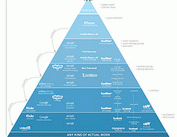In a Washington Post commentary piece last month ("Why rental apartments have more inefficient fridges," December 22), Brad Plumer investigated why rental units tend to have less efficient refrigerators than privately-owned homes. The answer, obviously, is that while the fridges are generally purchased by the landlord or property manager, it's the tenant who pays the electric bill.
This is a classic example of an externality: That is, the positive and negative consequences of a decision are not fully borne by the person making it; or put another way, the person who bears the consequences of a decision lacks the authority to decide. Under such circumstances, decisions that optimize the utility of a rational individual may result in suboptimal utility for the system as a whole. Maximum rationality and efficiency require that all the costs and benefits of the decision of any particular actor be included in the bottom line that actor uses to calculate personal utility.
Externalities result from authority. Authority enables one actor to maximize her personal utility, while making socially suboptimal choices, by imposing the negative consequences of her choices on other actors with less authority.
A hierarchy is a mechanism by which an actor at one rung of authority is able to shift cost and effort downward, while appropriating the benefits from others' efforts. In a hierarchy, the authority of those above is substituted for the experience-based judgment of those in direct contact with a situation. The judgment of the person best qualified to do a job is always subject to interference from someone with less knowledge, whose primary interest is in living off the surplus effort of those below.
When authority-based rules are allowed to interfere with the experience-based judgement of those actually in a situation, the result can only be a net reduction in efficiency and rationality. So the question is, how does such a suboptimal state of affairs continue?
The answer, to put it bluntly, is that it makes us easier to milk. The self-interest of those in authority lies not in optimizing the efficiency of the system as a whole, but in maximizing their own extraction of rents from it. Their interest is in maximizing the absolute size of their slice of the pie, even if doing so results in a smaller pie overall.
Those in authority cannot afford to do the most efficient thing -- stop interfering with the judgments of those who actually know what they're doing -- because they know their interests are diametrically opposed to ours.
Efficiency is possible only when the skills and experience-based knowledge to do a job, the full decision-making authority to use one's own judgment, and the full internalization of the rewards of one's own activity, are all united in the same actor. But severing these things one from the other is the most basic structural presupposition of our economic system.
Economic privilege -- authority -- exists so that those at the top can live off the unearned wealth created by others. Those on the bottom who produce the actual wealth cannot be trusted with the discretion to use their own judgment, because they have no rational interest in maximizing the extraction of rent by their superiors.
Hierarchies exist in situations where those engaged in an activity have a fundamental conflict of interest with those who direct and profit from that activity.
Shevek, the anarchist protagonist of Ursula LeGuin's The Dispossessed, came to the conclusion that hierarchy is a way to do as efficiently as possible what ought not to be done at all. A hierarchy is a machine -- basically a steam engine straight out of the factory age -- for compelling people to do what they have no direct rational interest in doing, for the benefit of those with whom they have a fundamental conflict of interest.





